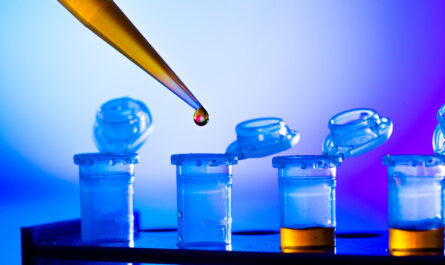Microbial API has seen significant growth in recent years driven by increasing demand from the pharmaceutical industry. Microbial fermentation using fungi, bacteria, and other microbes is becoming a more popular method for producing important active pharmaceutical ingredients compared to chemical synthesis.
Some of the key current trends contributing to the expansion of the microbial API include:
– Sustainability and green chemistry: Microbial fermentation is considered more environmentally-friendly than traditional chemical synthesis as it avoids the use of harmful organic solvents and produces less chemical waste. Many drug makers are prioritizing sustainable manufacturing methods.
– Cost effectiveness: While initial process development costs can be high, microbial fermentation offers lower production costs at commercial scale compared to chemical synthesis for some molecules. As biologics see rising use, lower drug costs are important.
– Innovation in strains and process engineering: Continued advancements in molecular biology, strain engineering, and fermentation technology have enabled the economic production of more complex molecules that were previously only accessible by multi-step synthesis. This is expanding the “addressable” for manufacturing.
Regulatory Approval
For a Microbial API to be incorporated into pharmaceutical drug products, it must undergo a rigorous approval process by regulatory agencies like the FDA in the United States or EMA in Europe. Registration dossiers must demonstrate the fermentation production process is well-characterized and controlled to assure drug quality and consistency between batches.
Though gaining necessary approvals adds time and cost to development, most regulators have become more familiar with and supportive of microbial manufacturing over the past decade. Once approved, it has access to global drug similar to those produced by chemical synthesis. However, some national regulatory bodies in developing regions may require additional local approvals.
Expanding Therapeutic Areas
While certain Microbial API like penicillin have been produced for decades, applications have expanded greatly as fermentation capabilities have advanced. A few prominent therapeutic areas where the use of it is growing include:
– Oncology: Several anti-cancer compounds originally requiring complex synthesis are now made at commercial-scale through microbial fermentation. These include paclitaxel, etoposide, and numerous antibiotics used in combination chemotherapy.
– Anti-infectives: As antibiotic resistance grows globally, microbes continue providing new anti-infective compounds through natural product discovery and engineered pathways. Daptomycin and fidaxomicin are examples of important antibiotics produced via fermentation.
– Metabolic disorders: Microbes offer alternative production methods for drug substances to treat diabetes, Gaucher’s disease, and other inborn errors of metabolism that were originally only available as synthetic small molecules or biologics.
– Neurology/CNS: Though challenging, microbial platforms show promise for manufacturing neuroactive drugs addressing Alzheimer’s, depression, and other CNS diseases facing high unmet need.
As the biotech industry innovates to meet demands across a wider range of diseases, microbial fermentation will likely contribute solutions for many more therapeutic areas in the future compared to traditional manufacturing routes limited by multistep synthesis.
Regional and Facility Expansion
The activity concentrated in certain key regional hubs but is expanding to new areas as production capacity grows. North America and Europe remain leaders in manufacturing approvals and sales revenues, with major producers operating large-scale fermentation facilities. However, other regions are also establishing strong positions:
– Asia Pacific: China, India, and other Asian nations have become major locations for production to serve both regional. Their large, low-cost manufacturing base provides competitive advantages.
– Latin America: Brazil in particular has developed biotech capabilities and sees rising production within its domestic pharmaceutical industry and for exports within Latin America and to other.
– Eastern Europe: Countries like Poland offer biotech-skilled workforces at competitive costs and see growing foreign investment, including expansions by major global microbial API producers.
– Middle East/Africa: While approvals occur mainly through US/EU regulatory pathways currently, these regions aim to develop indigenous pharmaceutical industries that may include future local production.
To meet projected continued demand increases, leading companies continue expanding global manufacturing footprints through new facility construction and strategic acquisitions. These trends ensure production capacity and regional access needed to drive further microbial API growth worldwide.
Opportunities for Startups and Universities
In addition to large, established manufacturers, opportunities exist for startups and academic spinoffs to participate in expansion. Universities globally conduct natural product discovery programs aiming to identify novel bioactive compounds with drug potential. Partnering such early-stage research with experienced drug developers serves as one startup pathway.
Crowdfunding platforms also see increasing interest for startups applying modern techniques like synthetic biology and machine learning to discover new microbial cell factories with capacities beyond traditional fermentation host organisms. While risks remain high, successful startups in this area could license novel production methods and establish innovative manufacturing technologies.
Academic technology transfers provide another avenue, allowing universities to license microbial strain collections or special process knowledge to companies exploring new therapeutic areas or production routes. Such collaborations help startups and small biotechs compete with larger firms and contribute novel products driving future its growth.
The microbial API industry sees many exciting opportunities to expand drug manufacturing applications and global revenues by leveraging continued innovation in biological engineering and industrial fermentation sciences. Regulatory acceptance, investment in new facilities, and startup.
*Note:
1. Source: Coherent Market Insights, Public sources, Desk research
2. We have leveraged AI tools to mine information and compile it




